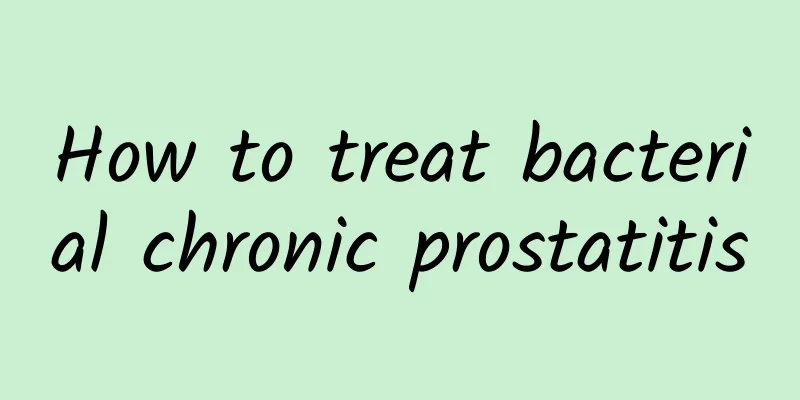How to treat bacterial chronic prostatitis

|
When it comes to bacterial chronic prostatitis, what you may think of is not the harm, but the recurrence of bacterial chronic prostatitis. In fact, bacterial chronic prostatitis is not a difficult disease to treat, but it takes a long time to cure, and many people will relapse repeatedly due to various reasons. Therefore, it is very important to treat bacterial chronic prostatitis correctly. Next, let's learn about the treatment of bacterial chronic prostatitis. Chronic bacterial prostatitis (CBP) is a common urinary system disease. It is more common in young men. Its etiology is complex, clinical manifestations are diverse, the course of the disease is prolonged, and it can recur. Patients generally have a long course of disease and severe symptoms, which not only affects normal work and life, but also causes great psychological pressure on patients. Retrograde urethral infection is an important route of infection for chronic bacterial prostatitis. With the increase in the incidence of sexually transmitted diseases, the incidence of prostatitis has also gradually increased. The disease lacks objective and specific diagnostic basis. Clinical diagnosis should be differentiated from diseases that may cause pelvic pain and abnormal urination. Patients with abnormal urination should be diagnosed to see if they have bladder outlet obstruction and abnormal bladder function. Causes The main pathogenic factor is retrograde infection of pathogens, mainly Staphylococcus, followed by Escherichia coli, Corynebacterium and Enterococcus, etc. Prostatic stones and urine reflux may be important reasons for the persistence of pathogens and recurrence of infection. 1. Treatment principles Chronic bacterial prostatitis: Oral antibiotics are the main treatment, and sensitive drugs are selected. The course of treatment is 4 to 6 weeks, during which periodic efficacy evaluation should be carried out. If the efficacy is unsatisfactory, other sensitive antibiotics can be used instead. α-receptor blockers can be used to improve urination symptoms and pain. Herbal preparations, non-steroidal anti-inflammatory analgesics and M-receptor blockers can also improve corresponding symptoms. 2. Treatment The purpose of treatment is mainly to relieve symptoms and improve quality of life, and the evaluation of treatment efficacy should be based mainly on symptom improvement. (1) General treatment: Quit drinking alcohol and avoid spicy food; avoid holding urine and sitting for long periods of time; keep warm and increase physical exercise. (2) Drug treatment: Commonly used drugs include antibiotics, α-receptor blockers, herbal preparations and non-steroidal anti-inflammatory analgesics. Other drugs are also effective in relieving symptoms. The above is an introduction to how to treat bacterial chronic prostatitis. For patients with bacterial chronic prostatitis, in addition to actively receiving professional treatment, they also need to pay attention to physiological hygiene, and do a good job of diet conditioning. At the same time, they actively participate in sports to improve the body's immunity and reduce the recurrence rate of bacterial chronic prostatitis. |
<<: Treatments for prostatitis
>>: Treatment of acne caused by endocrine disorders in men
Recommend
Jealous man
Many women find their boyfriends are very jealous...
There is a hard thing behind the testicle
Men should also regularly check for various disea...
Signs of a man's lack of energy
Generally speaking, men's urinary system func...
Can men practice yoga?
In life, we often see women practicing yoga in yo...
What food should I eat for chronic prostatitis?
Chronic prostatitis is a very common male disease...
What to do if there is a lot of prostatic fluid leakage
Male sexual function is a very important indicato...
Treatment methods for cryptorchidism, commonly hormones and surgery
The testicles are an important part of the male r...
What is interpersonal communication and what are the secrets of interpersonal communication?
In life, people are constantly in contact and com...
How to whiten oily skin, tips for whitening oily skin
People with oily skin have a lot of oil secretion...
What to do if the glans penis is rubbed and festering
Due to the infection of the glans penis skin, it ...
The fastest way for boys to lose weight
For boys, having a relatively fit body is somethi...
What causes penis erection failure?
The occurrence of male erectile dysfunction sympt...
How to remove blackheads on men's nose?
Blackheads are the most annoying thing. Blackhead...
What medicine can be used to treat my husband's triple positive?
In fact, only a healthy liver can give the patien...
How can ordinary men effectively reduce belly fat?
Every man wants to have a good figure, but becaus...









